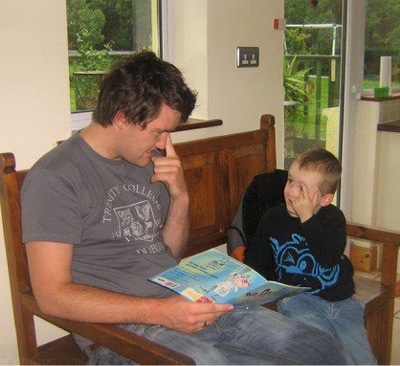March 11, 2013
Antidepressants are routinely prescribed after cardiac bypass surgeries. There’s no consideration for their adverse effects, nor do they consider that depression after such surgery is a reasonable emotion, nor do they bother to consider whether a patient actually is depressed. As a result, Larry, a happy-go-lucky man, died.

Heart Sun Cloud, by Aivaras Čiurlionis (cropped)
by Leonie Fennell
Meet Larry, 63. He’s Tony’s brother. He underwent a ‘triple bypass’ operation last Christmas, which involved spending 26 days in the Mater hospital, Dublin. Open heart surgery is known to be a very serious procedure, not least because the sternum, which is opened during surgery, can take up to 12 weeks to heal. Cardiologists acknowledge that heart surgery is life-changing, both physically and emotionally.
Larry was a good guy, the eldest of six. He was relaxed, funny, and easy-going, with a wife whom he knew since they were teenagers. He had 4 children and 7 grandchildren who adored him. Following Larry’s triple bypass, as is common following big operations, he started to feel a little down. He was prescribed an antidepressant Lexapro (Lundbeck’s poison and the same drug Shane was prescribed). He took Lexapro as prescribed for about a week. He told his son that his head felt like it was exploding, that it wasn’t in sync with the rest of him and that he was ‘all over the place’.
Larry went back to the doctor and his medication was changed, this time to a newer antidepressant, Valdoxan (AKA Agomelatine, manufactured by Servier) and the benzodiazepine Xanax, another potentially dangerous drug. Larry was prescribed this drug despite recent reports that Valdoxan is associated with serious hepatotoxicity (liver damage) and that caution is advised when prescribing for overweight/obese patients. I’m sure Larry wouldn’t mind me saying that he was more like Pavarotti than Rudolf Nureyev. Either way, I’m not quite sure why any medical professional would prescribe this drug, considering the doubts surrounding its efficacy and the possible dangerous adverse effects. Warning here.
According to Larry’s family, following the later prescription for Valdoxan and Xanax, he became manic, unable to function; the simplest of tasks became mammoth. He behaved bizarrely. For example: he wouldn’t allow his wife out of his sight, insisted on holding her hand at all times, seemingly afraid to let go. This was totally out of character for the usually easy-going Larry. As usual, this change was put down to the after-effects and trauma of this huge operation, not the mind-altering drugs, which are prescribed to unsuspecting patients, including Larry.
On 27th Febuary 2013, Larry took a rope into the garage of his old family home and in less than the required 12 weeks it took for his sternum to heal, Tony’s easy going brother was dead.
There are 2,370 suicides and 1,539 Cardiac arrests reported as a drug- reaction (of Xanax) in the RxISK website. Valdoxan (Agomelatine) is not on the RxISK website because it is not approved by the FDA in America. This drug has been called ineffective, potentially dangerous, and ‘a dog’—and had 3 (acknowledged) suicides in clinical trials, before it was even approved. For more about Valdoxan’s dodgy trials and other dodgy dealings with this IMB (Irish Medicines Board) approved drug, retired psychiatrist and scientist ’1 Boring Old Man’ explains it here.
The Valdoxan patient information leaflet has the usual IMB inadequate suicide warning, although directed at under 25s:
A meta-analysis of placebo-controlled clinical trials of antidepressants in adult patients with psychiatric disorders showed an increased risk of suicidal behaviour with antidepressants compared to placebo, in patients less than 25 years old. Close supervision of patients and in particular those at high risk should accompany treatment especially in early treatment and following dose changes. Patients (and caregivers of patients) should be alerted to the need to monitor for any clinical worsening, suicidal behaviour or thoughts and unusual changes in behaviour and to seek medical advice immediately if these symptoms present.
The fact that the so-called psychiatric ‘experts’ in Ireland deny that these drugs can cause suicide arguably negates the above warning. Even though Larry was aware of Shane’s case and the role that antidepressants played, he, like most people, trusted that the medical professionals knew better.
RIP Larry.
Prescribing Information Labels:
- Lexapro
- Valdoxan
- Xanax
Republished from “Meet Larry …”
Why Leonie Cares: In Her Own Words
My name is Leonie and my son’s name was Shane Clancy. He killed himself and another young man on Aug 16th 2009. He was 22 years old. 17 days beforehand he was prescribed the SSRI Cipramil, known in the U.S. as Celexa.
I am and always will be so very sorry that other people were involved in this tragedy. My lovely son took another young man’s life, Fact! Nothing I can ever say will change that. No words could ever say how very sorry I am and how I wish I could have changed things that night.

Shane never had a violent bone in his body and I know without a shadow of doubt that Cipramil caused this tragedy. Despite the fact that Shane killed himself in an extremely violent manner, the jury at Shane’s inquest rejected a suicide verdict.
Professor David Healy who was the expert witness at the inquest, clearly stated that this can happen to a certain percentage of people who can have a terrible reaction to anti-depressants, SSRI’s in particular.
After Shane’s inquest Lundbeck (the makers of cipramil) stated on Irish TV (RTE news) that their drug could not cause this and there was no evidence to support our claim. This was despite the Canadian ‘Dear Doctor’ letter admitting reports of suicide and homicide (self harm and harm to others) as a adverse effect of the same drug!
The ‘Irish college of psychiatry’ came out in the media defending their ‘medical model’, dismissing Prof. Healy’s opinion as speculative. Professor Patricia Casey of the ‘Irish College of Psychiatry’ attended Shane’s Inquest and spoke directly afterwards of her ‘issues’ regarding the Inquest (also on RTE News). Professor Casey has a long associationwith the same drug company Lundbeck.
The Irish Medicines Board stated that the Irish patient information Leaflet gives sufficient warning and we don’t need a black box warning here (unlike in Canada and the US).
Prof. Timothy Dinan, who also disputes our claim, is also a member of ‘The Irish College of psychiatry’. He is a committee member for ‘The Irish Medicines Board’ and also receives honoraria (payment) from Lundbeck.
Is there corruption going on here?






Leave a comment